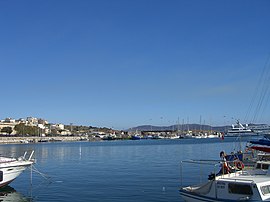Lavrio, Greece
|
Laurium Lavrio Λαύριο |
|
|---|---|

The port of Lavrio
|
|
| Coordinates: 37°42′N 24°3′E / 37.700°N 24.050°ECoordinates: 37°42′N 24°3′E / 37.700°N 24.050°E | |
| Country | Greece |
| Administrative region | Attica |
| Regional unit | East Attica |
| Municipality | Lavreotiki |
| Highest elevation | 11 m (36 ft) |
| Lowest elevation | 0 m (0 ft) |
| Population (2011) | |
| • Total | 7,078 |
| Time zone | EET (UTC+2) |
| • Summer (DST) | EEST (UTC+3) |
| Postal code | 195 xx |
Laurium or Lavrio or Lavrion (Modern Greek: Λαύριο; Ancient Greek: Λαύριον; before early 11th century BC: Θορικός Thorikos; from Middle Ages until 1908: Εργαστήρια - Ergastiria) is a town in southeastern part of Attica, Greece. It is the seat of the municipality of Lavreotiki. Laurium was famous in Classical antiquity for its silver mines, which was one of the chief sources of revenue of the Athenian state. The metallic silver was mainly used for coinage. The Archaeological Museum of Lavrion shows much of the story of these mines.
It is a sea port of much less importance than nearby Piraeus.
It is located about 60 km SE of Athens, SE of Keratea and N of Cape Sounio. Laurium is situated on a bay overlooking the island of Makronisos (ancient times: Helena) in the east. The port is in the middle and gridded streets cover the residential area of Lavrio. GR-89 runs through Lavrio and ends south in Sounio.
Recent discoveries date the first mines to 3200BC.
Systematic exploitation of mineral resources seem to have begun un the 6th century BC under Peisistratus. After the battle of Marathon, persuaded the Athenians to devote the anticipated revenue derived from a major silver vein strike in the mines of Laurion circa 483 BC to expanding the Athenian fleet to 200 triremes, and thus laid the foundation of the Athenian naval power. The mines, which were the property of the state, were usually farmed out for a certain fixed sum and a percentage on the working; slave labour was exclusively employed. As many as 20,000 slaves were employed at the height of the mining. A silver mint (Argyrocopeum) was at Laurion.
...
Wikipedia

